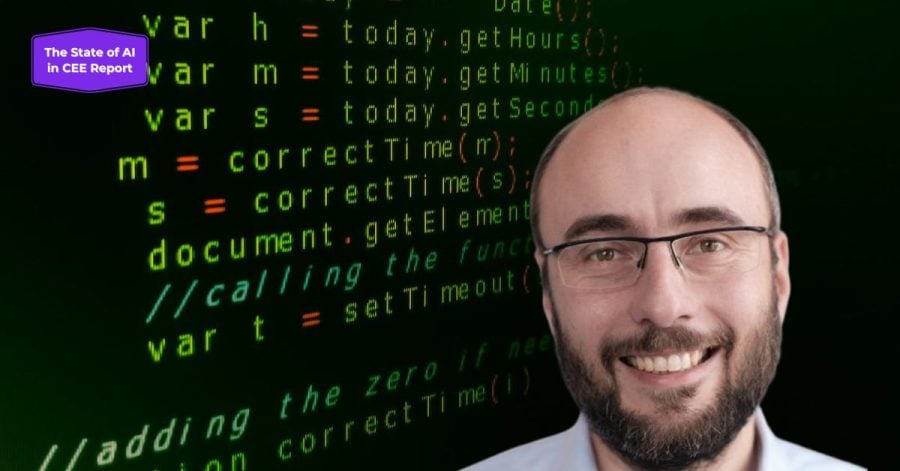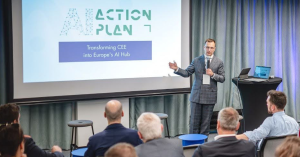Martin Rehak, an experienced entrepreneur and the CEO of Resistant AI, has played a significant role in establishing successful startups within the cybersecurity industry throughout his career.
One of them, Cognitive Security, was acquired by Cisco in 2013 and served as the foundation for Cisco’s Cognitive Threat Analytics (CTA) team, a unit dedicated to advanced threat detection for over 25 million users across the globe.
In an interview with The Recursive, Rehak discusses the transformative power of artificial intelligence in the realm of cybersecurity, its potential to revolutionize the way we protect sensitive information in an increasingly digital age, and much more.
The following interview was conducted as a part of The Recursive’s “State of AI in CEE” report. Download the full report with insights from 40+ experts and an analysis of 900 AI product companies from CEE here.
The Recursive: How has the use of AI in cybersecurity changed the enterprise sector?
Martin Rehak: The game of security is always the one of escalation and AI makes this no different. It is a patient game – the attackers do something and then they adapt, they reflect our actions, they hide and then we hit them again. The fundamentals never change. What changed is the timescales. In the old financial days, fraudsters were operating the timescales of days or months, you did commit a couple of frauds per day, you were happy, went home, and then you went to another branch, you flew to the other side of the country, etc.
Now you commit fraud – if it works, you add a simple cycle into the code that actually is doing the attack. And you scale up by a factor of 1000 within 10 seconds after the first one, and what seemed like a funny loss to a company can become quite catastrophic.
How has the Resistant AI product portfolio changed since its launch?
It has changed dramatically – our first idea was a complete failure and it’s important to share with the startups that you don’t always get things right immediately. Our idea was to look for gaps in AI models and to basically do vulnerability research on the AI models. Something that would be very popular now, but fell flat four years ago.
Our second idea was the one we started after a customer request – we started looking at fake images and digital documents. And this became the onboarding security product, which is now helping our customers to defeat increasingly sophisticated forgeries.
There is an emerging AI innovation ecosystem in the Czech Republic – what are the strengths and the weaknesses?
I think the strengths are a very good educational system with some very talented and smart people.
The second strength is the ability to attract talent from abroad despite the best efforts of the Czech state to keep everyone from coming. But that’s hopefully changing, although not quickly enough. There is the fact that the Czech Republic is an open place, and Prague is an open place where you want to live.
The third strength is that the ecosystem is shaping – when we started the first company doing AI here in 2008, everyone thought we were crazy and there were like three startups in the whole country, and there were one or two VCs. Now we have more than 20 VC funds in the country, and around 500 actual startups.
How would you evaluate the level of collaboration between AI companies and academia?
We have a very good relationship with academia because we come from academia, and the situation now is such that basically when you leave the university, going to work for a startup in the AI domain is almost like a default choice.
Therefore, academia has reflected the fact that there is a demand for students to go work for startups. There’s plenty of collaboration, and the door is quite open. We even keep training PhD students in collaboration with universities, which is all very good and very productive.
What are your thoughts when it comes to the talent pool that is available for AI companies?
The potential is quite huge because there are plenty of smart graduates leaving universities and plenty of talented people willing to move to Prague.
The reason why some people say it’s hard to hire people is that they are not willing to train the people. So as a company, the culture is such that you’ll have to hire young people with not so much experience. We don’t expect to be able to hire people who know how to do AI in the market.
What are you currently missing or would like to see more of when it comes to AI and deep tech innovation?
First, we are mostly selling to financial institutions and banks, and their willingness to embrace AI is somehow limited by the regulation. So one thing that’s missing is the regulator being firm with respect to the goals of the regulation, while at the same time being flexible in terms of means used to achieve the goal, where AI is one of the ways to solve it.
Before, you could have easily claimed that you can’t analyze millions of transactions per day to find all the money laundering because it’s too hard. With AI, the expectations of performance and quality should be rising, and they are rising.
What is your view on the EU’s AI Act and does it change anything for the industry?
If you look at the AI act, the whole act comes from the principle of precautionary regulation – someone wants to regulate the AI to protect us from our fear or to regulate the AI to avoid anything bad from happening. But if you look at the specific clauses, how for example high-risk systems have been defined, you see that something is considered a high-risk system based on a single anecdote or a single case somewhere in the US or in a book mentioned by someone.
If we want to turn Europe into a place where innovation doesn’t happen, and where innovation dies and be the last ones to adopt new technologies, then the AI act is a really good way of fast-forwarding to that future.
How has funding and investor support affected the overall development of Resistant AI?
I think that the funding situation has improved dramatically in Europe, and the European VC ecosystem is maturing very quickly. It doesn’t operate at the scale of the US one yet, but it already operates at a scale that’s pretty good and gives us enough support.
In CEE this became very obvious with UiPath, and other companies are following, so the region is growing very dynamically. I think the tech scene is actually taking in lots of talent, and for many students who are leaving universities, going into startups is becoming the career option to follow. It all kind of clicks together – it’s the talent, the capital, the maturity, and the knowledge of the previous generations of founders who lead the way and are now helping to drive the ecosystem.








